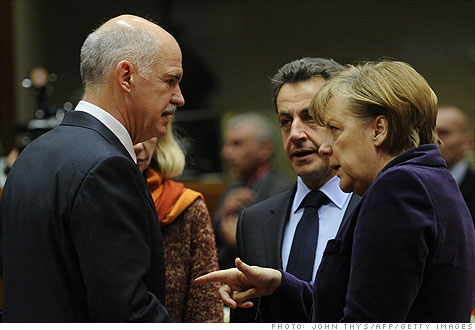Search News

Top EU officials will gather this week in Brussels to discuss Greece as European financial markets remain unsettled.
NEW YORK (CNNMoney) -- European officials are scrambling to resolve the debt crisis in Greece amid signs the contagion is spreading, but a comprehensive solution remains elusive ahead of a crucial summit on Thursday.
The leaders of the 17 euro zone member nations are set to meet in Brussels. The goal is to hammer out the terms of a second bailout for Greece and discuss ways to prevent the crisis from infecting larger economies in the monetary union.
The stakes are high. Nervous investors in the bond market have driven borrowing costs to record highs for some of the more vulnerable EU economies, such as Italy and Spain.
"Everyone agrees that chaos will result if the summit fails to deliver a comprehensive, practical, scalable and affordable approach to resolving Greece's debt problems," said Carl Weinberg, chief economist at High Frequency Economics.
But there is still disagreement over key aspects of the rescue plan for Greece, in particular how to involve the private sector. And investors remain skeptical that officials will be able to agree on a broad approach to the larger debt problems across the euro zone.
"I don't expect a game changer on Thursday," said Wolfango Piccoli, a director at the Eurasia Group in London. He said policymakers will likely announce some "muddle through" initiatives but stop short of a long-term fix for Greece.
Piccoli said officials will probably agree to give Greece enough additional funding to keep the nation solvent through 2014. They may also reduce interest rates or extend the pay back period on Greece's existing bailout loans.
But a sustainable solution would require months to implement and is unlikely to be announced Thursday, he added.
"The EU has been wasting time for a year and half and now the game is much more dangerous," said Piccoli. "But the time constraint doesn't give them the ability to come up with the comprehensive solution the market is looking for."
The EU has been grappling with the fiscal challenges facing Greece, Ireland and Portugal, which have huge debts and ailing economies. The festering crisis has intensified in recent weeks as investors fled the European bond market amid fears of a default by Greece.
Spain and Italy, two of Europe's largest economies, are now seen by investors as vulnerable to the crisis.
One of the biggest sticking points has been the involvement of private sector investors in future bailouts.
Germany has insisted that creditors bear some of the burden in any plan to reduce Greece's debt load by, for example, extending maturities on Greek bonds coming due in the next few years. But credit ratings agencies have made it clear that such a move would still constitute a default, even if it was voluntary.
That has put Germany at odds with the European Central Bank, which has said it could not accept Greek bonds as collateral if Greece were judged in default. The ECB has been providing Greece with much needed cash to pay its bills.
"The bottom line is that they're trying to involve private sector through some sort of a debt buy back or bond swap," said Piccoli. "But the amount that they can get is very limited."
As an alternative, EU officials are considering expanding the European Financial Stability Fund.
The fund, which was set up last year, is authorized to sell up to 440 billion euros worth of bonds backed by EU members. It then uses the proceeds to provide low-cost loans to troubled euro zone economies.
Some officials have proposed authorizing the fund to purchase sovereign debt in the secondary market. This would enable the fund to buy back Greek bonds directly from the private sector.
But the plan could take months to implement, since it would require the European Parliament to approve a change in the fund's legal framework, said Piccoli.
In addition to changing its mandate, policymakers could authorize a big increase in how much money the ESFS can raise.
Jonathan Loynes, an economist at Capital Economics, said the fund may be boosted to 1.5 trillion euros or more "to convince markets that the necessary firepower is now in place."
But the more stable EU economies may be reluctant to back such a proposal because it would mean accepting much of the risk from troubled economies on the fringe, he said.
If the core members reject the proposal, he added, "then our prediction of a year ago that the euro-zone will not survive in its current form could be borne out even sooner than we had anticipated."
There has also been talk of imposing a tax on banks to ensure private sector participation. But analysts said it's unlikely that officials will agree on the terms before Thursday. ![]()
| Overnight Avg Rate | Latest | Change | Last Week |
|---|---|---|---|
| 30 yr fixed | 3.80% | 3.88% | |
| 15 yr fixed | 3.20% | 3.23% | |
| 5/1 ARM | 3.84% | 3.88% | |
| 30 yr refi | 3.82% | 3.93% | |
| 15 yr refi | 3.20% | 3.23% |
Today's featured rates: